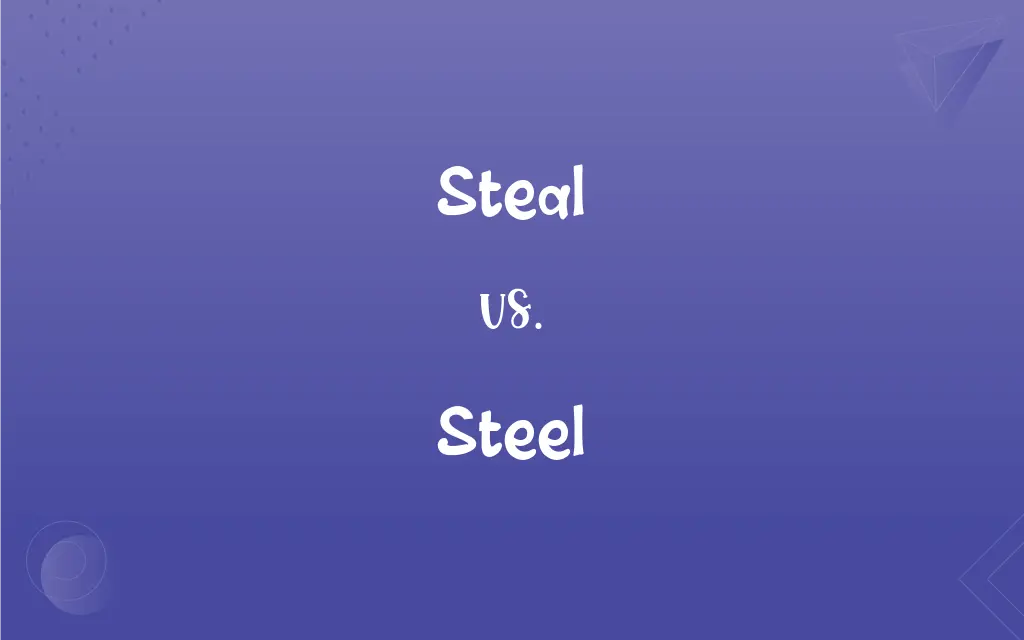Steal vs. Steel: What's the Difference?
Edited by Janet White || By Harlon Moss || Published on November 10, 2023
"Steal" means to take something without permission; "steel" refers to a hard, strong alloy of iron and carbon.

Key Differences
"Steal" and "steel" are two English words that, though pronounced similarly, have vastly different meanings. "Steal" refers to the act of taking something without permission, while "steel" denotes a type of metal.
Whenever someone takes something without the owner's consent, they "steal" it. Conversely, "steel" is a metallic alloy primarily composed of iron with a bit of carbon, making it hard and durable.
A common phrase using "steal" is "steal a glance," meaning to quickly look at something or someone without them noticing. On the other hand, "steel" often gets associated with strength and resilience, as in "nerves of steel," indicating someone's unwavering courage.
In sports lingo, to "steal" might mean to swiftly take away, as in basketball when a player takes the ball from an opponent. However, "steel" in the construction context refers to the metal beams and structures providing strength to buildings and bridges.
Summarizing, "steal" commonly denotes an act of theft or a quick action, while "steel" refers to a metallic substance known for its strength and resilience.
ADVERTISEMENT
Comparison Chart
Definition
To take without permission
An alloy of iron and carbon
Part of Speech
Verb (mostly), Noun
Noun
Usage in Context
Actions, criminal activity
Material, construction, strength
Common Phrases
Steal a glance, steal away
Nerves of steel, steel oneself
Associations
Theft, sneakiness, quickness
Durability, resilience, hardness
ADVERTISEMENT
Steal and Steel Definitions
Steal
To take something without permission.
He tried to steal a wallet from the store.
Steel
An alloy made primarily of iron and carbon.
The bridge is made of steel.
Steal
A bargain; something obtained at a low price.
This dress was a steal at just $10!
Steel
A device, like a rod or blade, made of steel.
He sharpened the knife on the steel.
Steal
To move silently or surreptitiously.
She tried to steal away without anyone noticing.
Steel
Symbolic of something strong or resilient.
He had a will of steel.
Steal
To achieve or win easily or unexpectedly.
That move was a steal for the team.
Steel
To mentally prepare oneself for something difficult.
She steeled herself before the tough conversation.
Steal
In sports, to swiftly take away from an opponent.
He managed to steal the ball during the game.
Steel
Indicating a bluish-gray color.
His eyes were steel blue.
Steal
To take (the property of another) without right or permission.
Steel
A generally hard, strong, durable, malleable alloy of iron and carbon, usually containing between 0.2 and 1.5 percent carbon, often with other constituents such as manganese, chromium, nickel, molybdenum, copper, tungsten, cobalt, or silicon, depending on the desired alloy properties, and widely used as a structural material.
Steal
To present or use (someone else's words or ideas) as one's own.
Steel
Something, such as a sword, that is made of steel.
Steel
A quality suggestive of this alloy, especially a hard, unflinching character.
FAQs
Is "steel" always about the metal?
No, "steel" can also refer to preparing oneself mentally or indicate a bluish-gray color.
What is "steel" primarily made of?
Steel is an alloy primarily composed of iron and carbon.
Can "steal" be used in a positive context?
Yes, like when referring to a good deal, e.g., "That sale was a steal!"
What's the main difference between "steal" and "steel"?
"Steal" pertains to theft or quick actions, while "steel" relates to a metal or strength.
Is "steal" always used negatively?
No, contexts like "steal a kiss" or "steal a moment" are not necessarily negative.
How is "steal" used in the context of a bargain?
When something is acquired at a low price, it's often said to be "a steal."
Does "steel" have symbolic meanings?
Yes, steel often symbolizes strength, resilience, or determination.
When should I use "steal"?
Use "steal" when referring to taking something without permission or describing a quick action.
How is "steel" used in idiomatic expressions?
Phrases like "nerves of steel" or "steel oneself" utilize the word "steel."
Can "steal" be a noun?
Yes, as in "The artwork was a steal at that price."
Does "steal" always imply criminal activity?
Not always. Phrases like "steal a glance" don't imply criminal acts.
Why is "steel" associated with strength?
Steel, as a metal, is known for its hard and durable properties, making it synonymous with strength.
Can "steal" mean to obtain something beneficial?
Yes, in contexts like "That last-minute goal was a steal for the team."
Can "steel" refer to a device or tool?
Yes, tools like sharpening rods can be called "steels."
How can "steal" be used in sports?
In sports like basketball, "steal" refers to taking the ball away from an opponent.
What color is associated with "steel"?
Steel can refer to a bluish-gray color, often called "steel blue."
What properties does "steel" have?
Steel is known for its strength, durability, and resilience.
Is "steel" involved in construction?
Yes, steel is frequently used in construction due to its strength and durability.
Can "steal" refer to a sneaky movement?
Yes, like "He tried to steal into the room unnoticed."
Are "steal" and "steel" homophones?
Yes, they sound alike but have different meanings.
About Author
Written by
Harlon MossHarlon is a seasoned quality moderator and accomplished content writer for Difference Wiki. An alumnus of the prestigious University of California, he earned his degree in Computer Science. Leveraging his academic background, Harlon brings a meticulous and informed perspective to his work, ensuring content accuracy and excellence.
Edited by
Janet WhiteJanet White has been an esteemed writer and blogger for Difference Wiki. Holding a Master's degree in Science and Medical Journalism from the prestigious Boston University, she has consistently demonstrated her expertise and passion for her field. When she's not immersed in her work, Janet relishes her time exercising, delving into a good book, and cherishing moments with friends and family.






































































